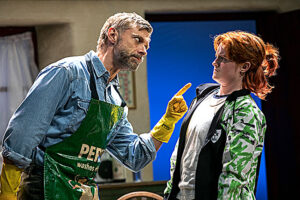
David Hennessy spoke to some of the cast of a new production of Martin McDonagh’s The Lieutenant of Inishmore before it comes to the stage in Liverpool.
The Everyman theatre is bringing Martin McDonagh’s The Lieutenant of Inishmore to Liverpool.
Set in the Ireland of 1993, the play tells the story of Padraic, the ‘mad’ leader of the INLA.
Considered too mad for the IRA, Padraic pulls out the toe nails of drug dealers for the newer splinter group that was established by IRA men who opposed the idea of a ceasefire.
However, when Padraic finds out that Wee Thomas, his cat, isn’t well, he returns home to Inishmore. It is then that he finds out Thomas has been killed and he goes looking for revenge.
The Lieutenant of Inishmore was ranked by the Daily Telegraph as one of the 15 greatest plays ever written.
The play was first staged by the Royal Shakespeare Company in 2001 before transferring to the West End.
It would be performed for the first time on Broadway in 2006 with a cast that included a young Domhnall Gleeson and David Wilmot. That production would be nominated for four Tony Awards.
It returned to the West End in 2018 with a cast that included Aidan Turner and Chris Walley. It would win Walley an Olivier Award and a Critics’ Circle Theatre Award.
Martin McDonagh came to prominence as the triple Olivier Award-winning playwright of pieces such as The Cripple of Inishmaan and The Beauty Queen of Leenane.
However, since then he has gone to be the lauded writer/ director of films such as In Bruges, Seven Psychopaths, Three Billboards Outside Ebbing, Missouri and The Banshees of Inisherin.
The Lieutenant of Inishmore is from his Aran Islands trilogy that started with The Cripple of Inishmaan.
The new production stars Julian Moore- Cook as Padraic with Katherine Devlin playing love interest Mairead.
Directed by Chris Sonnex, the all- Irish cast also includes Taylor McClaine, Michael Tient, Alan Turkington, Jason Kelly and Cameron McKendrick.
The Irish World chatted to some of the cast ahead of the new production.

Katherine Devlin and Michael Tient
Katherine Devlin, from Cookstown in Tyrone, plays Mairead.
Michael Tient, from the Ballymun/ Finglas area in Dublin, plays Brendan.
Katherine is known for playing Annie in the Belfast set police drama, Blue Lights.
Michael Tient’s stage work includes The Rising of the Moon at Bewley’s Café Theatre.
How have rehearsals been going?
Michael: “Rehearsals have been great craic.”
Katherine: “Yeah, really good fun. Good craic. Everybody’s really sound.
“We did a big run through of the play yesterday so the only way is up.”
Are you big fans of McDonagh?
Katherine: “Yeah, massively.
Michael: “Yeah, I’ve really grown to love him a lot more in the last few years especially from drama school. I remember all the lads would be talking about Martin McDonagh.
“Someone did The Pillowman at our showcase and we were watching the comedy in it but also how dark it was. It was just like the writing was always so filled with life, and comedy as well.”
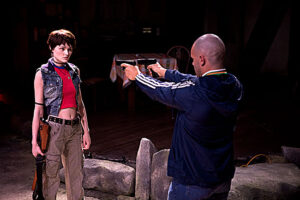
This is your first time acting in a McDonagh play but have you happened to catch productions, even a previous production of this one?
Katherine: “Yeah, I actually have.
“I saw a production a couple of years ago. Paul Mescal was in it. It was in the Gaiety Theatre in Dublin.
“Paul was playing Padraic and it was a great production.
“It’s so interesting when you see a production of a play that you’re in and the nuances are quite different but also there’s always going to be the same jokes involved. It’s interesting just to compare the two of them.”
Is it typical of McDonagh in there being a lot of dark comedy in this play?
Michael: “There’s just so many laughs.
“I remember the first time I read it all the way through for the audition.
“I was just laughing out loud at a script and you don’t find scripts like that a lot of time, you’re just constantly finding the humour more and more and then I remember the first read through. Just hearing everyone’s voice and just actually hearing everything out loud, it was just so much more real and got me really excited. I’m still excited to do it.”
Katherine: “I agree.
“It’s so interesting, McDonagh’s work, where the characters kind of represent something bigger than themselves.
“So even though you have this very clever timing and comedy and political things involved within the play, there’s a different layer to the characters and they represent something just so much bigger than themselves.”
Michael: “We talk about so many different splinter groups and the INLA being a lot more angry, a lot more violent and volatile because they’re obviously split from the IRA because they thought the IRA were being too passive to everything that was going on.
“The INLA lads, I play Brendan, really want to free Ireland so they bring Padraic back home and kill his cat.
“That is the only thing that they can do, to kill his cat to get him to come back.
“Because, of course, the only thing Padraic would care about to come back to would be his cat dying.”
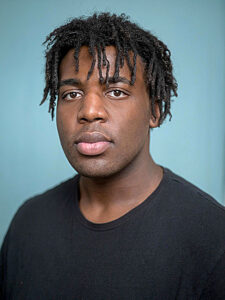
Would you agree that, although it is exaggerated almost to cartoon levels, it is a story and characters rooted in real life?
Katherine: “Yeah, absolutely. It’s satire. They’re caricatures but within that, there’s something that really rings home and particularly when it comes to the small town mentality.
“If you look at the writings of Chekhov, for example, you can draw similarities with this idea of setting a play within a small town or within a house and the confinements of that and how characters are just representations of their environment and the struggle involved in that as well.”
Tell us a bit about your characters. Katherine you play Mairead and she is something of a love interest for Padraic…
Katherine: “Mairead’s from Inishmore.
“She runs the town.
“She is the Big shot of Inishmore.
“She loves blinding cows as a political protest and she’s got so much passion about her.
“She wants to stand for what she thinks is right.
“I think it’s so funny because the very first intro of Mairead is her trying to blind her brother with an air rifle, over a cat again, so you’re always going back to this idea of, they’ll do anything to protect cats which is brilliant.
“But then she meets Padraic and there’s a love interest there, for sure.
“They’re both very similar in a lot of ways but also, she’s just completely infatuated by this person and she’s so in love with his, I suppose, passion and his ideologies but then as well his persistence.
“But on the flip side of things Mairead, for me, is someone who is a product of her environment but is not so much someone that’s like a bit lost, but she’s still very much trying to find herself.
“She’s 16 years old. The prefrontal cortex hasn’t been developed yet, there’s probably not that many good looking lads around Inishmore and then Padraic comes onto the scene.
“Then she’s just like, ‘Oh my God, he is gorgeous looking and he’s intelligent and funny’, and stands for what is right in her eyes.
“Naturally she’s just going to be like, ‘Yeah, I’ll do anything for you’.”

And Michael you play Brendan who, as you say, is in the INLA…
Michael: “He’s from Belfast and he comes over to Inishmore to stop Padraic from killing drug dealers who are actually helping by them selling drugs.
“They are giving some of the profits they make to the INLA, to the cause.
“(But) Padraic is killing them.
“So it’s Brendan, his brother Joey and Christy.
“They are obviously trying to come up with this plan.
“Brendan very much wants to be the best soldier he can be.
“He’s trying to prove himself to Christy throughout the play.
“And people may say he’s a bit thick but I think he’s actually very smart and very intelligent and he’s very confident about what he believes in and the fight to keep the INLA going, to keep it strong.
“And he’s a man who knows his quotes.
“Doesn’t know who says the quotes, but he knows his quotes.
“Like Katherine was just talking about, these characters are really young.
“Brendan’s 20 and Padraic is 21, Mairead is 16.
“These characters are really young and for them to be in this murder mindset of having to save the country by shooting the guy who’s trying to stop the cause, these are kids being soldiers and having to fight for their country because they feel the need.
“Brendan is influenced by Christy because he looks up to him and sees him as someone that’s going to be on the right side of history in Brendan’s eyes.”
Katherine: “It’s satire. It’s not supposed to be set in reality and the way I think that McDonagh has written it, it’s taken as the surface level, and then once the play is over it’s, ‘Why were we laughing at that? Why was that funny? Does that represent something a lot deeper than shooting cats?’
“It is young people that are working class and don’t have much to be doing during the day and they’re trying to find a reason to live and to matter within society.”
Michael adds: “A cause.”
Does it have a sense of tragedy in it?
Katherine: “Absolutely, there really is.
“It’s also very important to note within Ireland we have massive emigration, we have so much emigration in Ireland especially with young people.
“You have young people going to Australia, New York, etc.
“So I find it’s so lovely to look at films or plays that highlight things like that, such as Brooklyn. I absolutely love the film Brooklyn.
“But then also, you do have people that stay within their little small town and they’re happy out doing that and that’s completely grand.
“You do have people, not just in Ireland but all over that just stay within their small towns or they never leave their small towns.
“I’m saying that there’s something sad about that but some people just feel a bit claustrophobic in that.”

It’s not sad unless they’re yearning for something else..
“Exactly, yeah.”
That’s why it is good to do this play in Liverpool, isn’t it? Speaking of emigration, Liverpool was so often the first stop..
Michael: “I think it’s really important because Liverpool is the nearest stop. The flight over here is 30 minutes.
“It’s the closest place for Irish people, even back to the famine and stuff, to come to Liverpool and settle and stuff.
“Even the accent in Liverpool is inspired from different Irish dialects as well.
“It’s very close.
“I feel like even talking to people about the play, they know who Martin McDonagh is.
“I think audiences are going to enjoy the story.
“They’re going to enjoy the violence but also get a message of how much these young people are trying to fight for the cause and fight for what they believe in.
“I think they’ll enjoy that.
“It’s just a blessing to be in Liverpool.
“This is my first big professional long running show in a different country so that’s also very exciting.”
Katherine: “Yeah, it’s really exciting and the people are so welcoming here.
“You just walk down the street, and there’s so many Irish bars which is class.”
I didn’t ask about the title, the Lieutenant of Inishmore. Does this refer to Padraic?
Katherine: “I think Mairead is The Lieutenant of Inishmore.”
Michael: “I have to say I think Mairead is the lieutenant of Inishmore.”
Katherine: “Mairead is the back bone.
“She runs Inishmore.
“She’s the it girl.
“Maybe I’m just biased.”
Michael: “No, I’m with you.”
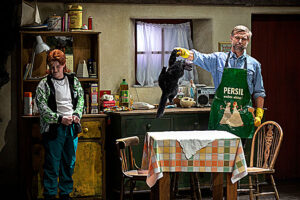
Alan Turkington and Taylor McClaine
We spoke to Alan Turkington and Taylor McClaine who play the parts of Donny and Davey.
Alan Turkington, from Sandholes, Co. Tyrone, has acted for the Royal Shakespeare Company, on the West End and on Broadway. His screen credits include Netflix series Heartstopper.
Taylor McClaine, from Pallasgreen in Limerick, has stage credits that include lauded performances in Virginia Woolfe’s Orlando at Jermyn Street Theatre, London and Brendan Behan’s The Quare Fellow at the Abbey in Dublin.
How are the rehearsals going so far?
Taylor: “Really, really, well.
“I think we all felt on week one how safe of a room it was to be weird and wild and creative with our choices.
“Especially for me off the back of the jobs I’ve done before I really feel safe and I feel like it has just continued in the three weeks which is great.
“It should always be the standard, but not always is so then when you do get it, I think you appreciate it all the more.”
Alan: “I think it’s really important in a play like this which is completely chaotic and off the wall and violent, albeit hilariously violent.
“So much depends on the chemistry of the space, the chemistry of the group, and they’re a nice bunch, aren’t they?”
“I don’t know about Alan,” Taylor jokes in response. “Turkington I can take or leave.”
Alan: “It’s really nice because it doesn’t happen very often that you get an all Irish cast, and not to be hugely patriotic or anything like that but I just think there’s a really particular vibe when that happens and I don’t know whether you find a rhythm quicker-“
Taylor: “It’s like you have that shorthand already built in so then if you already have that shorthand from day two, then really only way is up.”
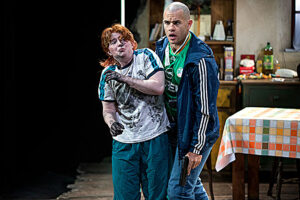
Are you big fans of McDonagh’s work?
Taylor: “So yeah. I’d say a fan, definitely.
“I wouldn’t have been massively familiar with his work before this.
“I had the students’ book of the play for A level students, and it made the good point that when you take McDonagh’s work really seriously and really realistically, you kind of lose the point.
“And that’s what I love about the production that we’re doing, is that it’s not totally absurd and off the wall, it’s still rooted in some sort of realism but we’re not really trying to play the period or play the massive stakes that should be involved.
“We get to have fun with it.
“I think that’s both McDonagh’s writing, the fact that we’re all Irish but also I think the way that Chris is directing us.
“He’s kind of allowing us that freedom to kind of use McDonagh’s work as a foundation and build from, which I love.”
Alan: “I think this play is just very clearly one of his best pieces.
“We’re now starting to run it in rehearsals and we’re all still laughing.
“We’ve heard it 100 times now.
“And also it’s interesting for how many writers, particularly playwrights, I think this is one of their favourite pieces as well.
“It is just kind of a super successful, hilarious gem of a piece really.”
Taylor adds: “It’s a real joy to do.
“I think what’s nice about what we’re doing is that you don’t have to know McDonagh to be able to understand what we’re doing which I suppose is the mark of good production and good acting maybe, who knows?”

Although it is chaotic and cartoonish in elements, the story and its characters are very much based in reality, aren’t they?
Taylor: “Yeah. Julian Moore- Cook, who is our Padraic and has done a production of this play but not in the same character, is doing a fantastic job in terms of marrying that trigger happy, mental and physical, with that kind of soft side that would have a cat and would go on a killing rampage if the cat was hurt.
“It’s been a joy to watch him explore that character more and more because it’s a tall order to get that casting and try to edge away from the severity of the stereotype, I suppose.
“Again, it’s like Martin McDonagh has written it in such a way that I think if you take it at face value, it’s not half as interesting as if you pepper in a bit more nuance to it.
“That’s where we come in then and get to mess around with it.”
Alan: “It’s very much characters in ultra-extreme, ultra-violent situations but then every so often McDonagh just kind of cuts through with a line that’s so sort of, on one level, naturalistic and dry that it just sort of roots it.
“And they’re, I think, some of the funniest lines in the play as well.
“That, I think, really just keeps this ridiculous situation very real for an audience.”
I’m sure it displays Martin McDonagh’s usual brand of dark humour..
Taylor: “And it’s nice as well having the all Irish cast where we’re all pretty used to that.
“We’ve grown up around it.
“We utilize it day to day.
“It’s being funny while complaining, being funny while giving out to someone.
“We cut through the seriousness of it with the most banal, normal human lines.
“I think what’s nice is that the characters aren’t trying to be funny.
“No one is trying to be funny.
“And when we are, it tanks.
“The character tries to be funny and it doesn’t work so the comedy just comes from those people in those heightened scenarios, which is great.”
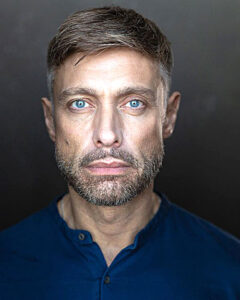
Isn’t it fascinating how Martin McDonagh, who has spent much time in Ireland but grew up in London, writes Irish characters so true to life?
Alan: “I think a lot of the world maybe think he grew up on the Aran Islands, whereas actually it was where I live in Camberwell.
“But you’re right, that does give him kind of a unique take.
“He’s outside it but he’s in it and it’s all very knowing.
“I think in Lieutenant especially, you get the gag, the overall gag, which is absolutely not sending up the Irish.
“I think in a way it’s actually sending up people’s opinions of the Irish and outsiders’ perspective of the Irish.”
Taylor: “Challenging that stereotype.
“Because that’s the thing: The people that we’re playing, although they might be slightly caricature-y, they’re still very real.
“I’m from the countryside and I’ve met all of these people.
“They fully exist and they exist as they’re written.
“It’s then trying to bring a little bit more nuance into that as well.
“It’s also just nice to be doing a play that’s set in Ireland that isn’t about suffering.
“Although there is suffering in the play, it’s not the bread and meat of what we’re talking about.
“We’re not in the laundries and we’re not dying in the rising.
“It’s just nice to be doing something a little bit different.”
Alan, you play Donny while you’re Davey, Taylor.
How do your characters come into it?
Taylor: “We have a nice little double act, don’t we?”
Alan: “We’re together throughout the play constantly.
“Chris, our director, said in the first couple of days that we’re the audience in a way.
“We’re very ridiculous versions of Rosencrantz and Guildenstern.
“I am Padraic’s father and a lot of the action of the play takes place in mine and what was Padraic’s home.
“Davey is…”
Taylor: “Chris had a nice way of putting it: He’s the hero of the play but he’s too stupid to know it.
“He’s a bit of a wet blanket and he means well so often, but him meaning well has got him into so much trouble.
“He’s the brother of Mairead who is Padraic’s love interest.
“I think they (Donny and Davey) are very distant neighbours.
“They spend a lot of time together.
“They’re both loners in their own right and they’ve just kind of found a weird parasocial relationship being lonely together.”
Alan: “No spoilers but it’s us that kind of kick off the action.
“It’s us that discover the not quite alive cat at the beginning and then thereafter, it’s how we respond to and address that not quite alive cat.”

How do you see a play like this going down in Liverpool?
For it being such an Irish city, I’m not so sure how many Irish plays are performed there. This could be quite the event..
Alan: “I think you’re right.
“They definitely call it a second Belfast here.”
Taylor: “And there’s so many gingers. I’ve never seen so many of us in my life.
“I’m like, ‘Who’s your mam? Where’s your family from?’”
Alan: “I’ve been lucky enough to work up here twice during the last year and I don’t remember seeing a piece like this, a piece of Irish theatre being played so I think that will be quite interesting.
“I think it will be really good for local audiences because I don’t know why it doesn’t happen more.
“I think- Oh God, I’m gonna fricking curse it now but I do think it’ll go down a wee bit of a storm.
“There’s the Liverpool sense of humour: You will never be more bluntly confronted than by a Liverpool taxi driver.
“I got into a cab at the beginning of the year and the cab driver knew that he was picking me up from a set and he just said at the end of the short journey, ‘You know, when you got in this car and I saw what you did, I thought you’d be a w**ker, but you’re all right, you know?’
“They’ll tell it like it is and this play tells it like it is.
“I think it’ll be a treat for them and us hopefully.”
Taylor: “I feel like a lot of Irish theatre is so steeped in the history that we have that you kind of almost need to know a bit of the history to be able to understand the context of the play, but this doesn’t really need that.
“You can not know anything about the IRA, not know anything about any (Irish) history and still have a great time.
“It’s been a very easy sell to people, especially people who would not want to go to see theatre or have very little interest in it.
“When you go through the storyline of what happens they’re like, ‘Oh, that actually does sound interesting. It does sound like something I’d want to see’.”
Alan: “I think they’re really targeting a younger audience and that’s great as well, because that always needs to happen more.”

A lot of McDonagh’s plays have that element of tragedy whether it’s The Beauty Queen of Leenane or The Cripple of Inishmaan, there is often a tinge of sadness.
Is it the same with this play?
Alan: “Yeah. You (Taylor as Davey) even ask me..”
Taylor: “Yeah, we have a line towards the end where Donnie and Davey have a moment of respite amongst the chaos and it’s only then that we’re like, ‘Are you sad? Are you doing okay?’
“Maybe it’s not the most obvious and it’s definitely not over egged but there’s a lot of different forms of tragedy, especially for Mairead, I think more in the terms of expectation versus reality.
“I think that is where the biggest tragedy comes in in this play: What people have dreamed of and the reality of what they have to do to try and achieve those dreams, and whether it’s worth it.”
Have you had any word from the playwright himself?
Taylor: “He wasn’t part of my audition process anyway but we were told that he, as part of his licensing and stuff, has to sign off on all casting.
“So he’s seen our faces and he knows who we are. Whether he turns up or not is a different story. Whether he likes it or not is a different story altogether as well.”
Alan: “I know he’s very particular about when and where his work is done as well, professionally at least so that’s quite nice.
“Between that and the casting approval, it’s nice that you know that he still seems quite invested in his work and how his work is seen and represented.
“And he might come, you never know.”
Taylor: “I’ll be very intrigued to see what he thinks if he does.
“Come up on the train now, we’ll pay for your ticket.”
The Lieutenant of Inishmore runs 21 September- 12 October.
For tickets and more information, click here.


